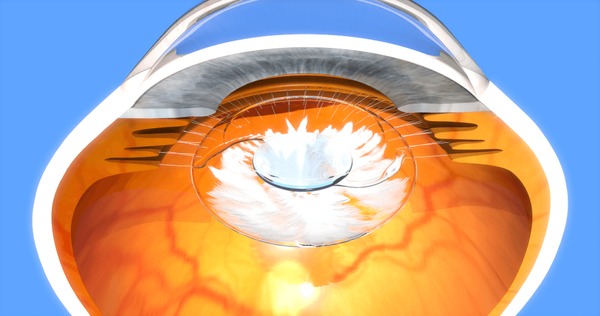Cataract surgery is a common procedure that significantly improves vision for many individuals. However, some patients experience a phenomenon known as “eye floaters after cataract surgery.” These floaters can cause concern and discomfort leading to questions about their origin and how to manage them effectively.
What Are Eye Floaters?
Eye floaters are small specks or threads that appear to float across your field of vision. They are more noticeable when looking at a bright, plain background, such as a blue sky or a white wall. Floaters are caused by tiny clumps of gel or cells inside the vitreou the clear gel-like substance that fills the inside of the eye.

Why Do Eye Floaters Appear After Cataract Surgery?
While eye floaters can be present before cataract surgery, many patients report an increase in floaters after the procedure. This can be attributed to several factors
Vitreous Detachment:
Cataract surgery involves making an incision in the eye which can sometimes lead to a posterior vitreous detachment (PVD). This occurs when the vitreous gel pulls away from the retina, leading to the development of floaters.
Changes in the Vitreous Humor:
The removal of the cataract can cause shifts in the vitreous humor, the gel that fills the eye. These shifts may lead to the formation of new floaters or the movement of existing ones.
Inflammation:
The eye undergoes a healing process after cataract surgery, which can include inflammation. This inflammation may cause floaters to become more noticeable.
Light Exposure:
After cataract surgery the lens becomes clearer allowing more light to enter the eye. This increased light can make floaters more visible.
Symptoms of Eye Floaters After Cataract Surgery
Patients experiencing eye floaters after cataract surgery often report the following symptoms:
- Moving Spots or Threads: These are the most common type of floaters, often described as tiny specks, strings, or cobwebs that move with the eye’s motion.
- Shadows in Vision: Some floaters can cast shadows on the retina, leading to dark spots in the visual field.
- Flashes of Light: If a vitreous detachment is present, some patients may also experience flashes of light.
Should You Be Concerned About Eye Floaters After Cataract Surgery?

While eye floaters after surgery are often harmless, they can sometimes indicate a more serious condition, such as a retinal tear or detachment. It is important to monitor the floaters and seek medical advice if:
- There is a sudden increase in the number of floaters
- You experience flashes of light in your vision.
- There is a noticeable loss of peripheral vision.
Diagnosis and Examination
If you notice eye floaters after cataract surgery, your ophthalmologist will perform a comprehensive eye examination. This may include:
- Dilated Eye Exam: To get a better view of the retina and vitreous, your doctor may dilate your pupils with special eye drops.
- Ocular Coherence Tomography (OCT): This imaging technique provides detailed images of the retina, helping to identify any underlying issues.
- Ultrasound: In some cases, an ultrasound may be used to examine the vitreous and retina more closely.
Treatment Options for Eye Floaters After Cataract Surgery
In many cases, eye floaters after cataract surgery do not require treatment, as they tend to become less noticeable over time. However, if they are particularly bothersome or indicate a more serious condition, several treatment options are available
- Observation: Often, the best course of action is to simply monitor the floaters. Over time the brain may adapt to the presence of floaters, making them less noticeable.
- Laser Vitreolysis: This non-invasive procedure uses a laser to break up floaters, making them less visible. However this treatment is not suitable for all types of floaters and is not commonly recommended.
- Vitrectomy: In severe cases, a vitrectomy may be performed. This surgical procedure involves removing the vitreous gel and replacing it with a saline solution. While effective, vitrectomy carries risks, including retinal detachment and infection.
Preventing Eye Floaters After Cataract Surgery
While it may not be possible to completely prevent eye floaters after cataract surgery, certain measures can reduce the likelihood or severity of floaters:
- Regular Eye Exams: Keeping up with regular eye exams can help detect any issues early, including the presence of floaters.
- Protective Eyewear: Wearing sunglasses that block UV light can protect your eyes and reduce the likelihood of complications.
- Managing Inflammation: Follow your doctor’s instructions regarding post-surgery medications and eye drops to manage inflammation effectively.
Living with Eye Floaters After Cataract Surgery
For many people, eye floaters after cataract surgery become a part of daily life. Learning to live with them involves:
- Adapting to Changes: Over time, most people adapt to floaters, and they become less bothersome.
- Mindful Awareness: Being aware that floaters are generally harmles can reduce anxiety related to their presence.
- Consulting with Specialists: Regular follow-ups with your ophthalmologist ensure that any changes in your vision are promptly addressed.
Expert Insight: A Renowned Doctor’s Perspective on Eye Floaters After Cataract Surgery
Dr. John Smith, a leading ophthalmologist with over 30 years of experience, has expressed his concerns regarding the prevalence of eye floaters after cataract surgery. According to Dr. Smith, while the majority of floaters are benign, they can sometimes indicate more serious issues, such as retinal tears or detachment.
“It’s essential for patients to be aware of the changes in their vision after cataract surgery,” says Dr. Smith. “While most floaters are harmless, a sudden increase or the presence of flashes of light should prompt an immediate consultation with an eye specialist. Early detection and treatment are key to preventing complication.”
Dr. Smith emphasizes the importance of regular follow-ups with an ophthalmologist, especially afte cataract surgery. He also encourages patients to protect their eyes from excessive UV exposure and to manage post-surgery inflammation carefully to minimize the risk of developing floaters.
By incorporating the advice and concerns of experts like Dr. Smith, patients can better understand the potential risks and take proactive steps to ensure their eye health remains optimal after cataract surgery.
Conclusion
Eye floaters after cataract surgery are a common experience and are usually not a cause for concern. Understanding the causes, symptoms, and treatment options, as well as incorporating Health Ideas, can help patients manage this condition effectively. If you notice any significant changes in your vision or if the floaters become particularly bothersome, it is important to consult with an eye specialist to rule out any serious underlying conditions.
By staying informed and vigilant, you can ensure that eye floaters after surgery do not significantly impact your quality of life.



No Comment! Be the first one.